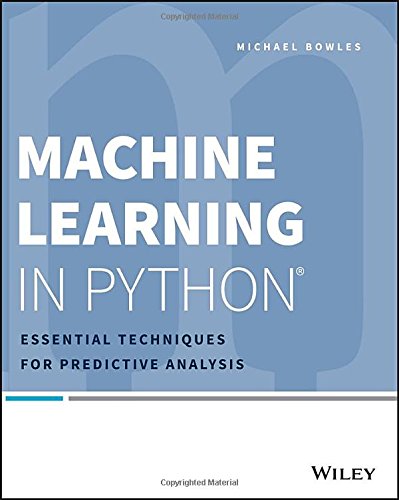

Most ebook files are in PDF format, so you can easily read them using various software such as Foxit Reader or directly on the Google Chrome browser.
Some ebook files are released by publishers in other formats such as .awz, .mobi, .epub, .fb2, etc. You may need to install specific software to read these formats on mobile/PC, such as Calibre.
Please read the tutorial at this link. https://ebooknice.com/page/post?id=faq
We offer FREE conversion to the popular formats you request; however, this may take some time. Therefore, right after payment, please email us, and we will try to provide the service as quickly as possible.
For some exceptional file formats or broken links (if any), please refrain from opening any disputes. Instead, email us first, and we will try to assist within a maximum of 6 hours.
EbookNice Team

Status:
Available0.0
0 reviewsMachine Learning in Python shows you how to successfully analyze data using only two core machine learning algorithms, and how to apply them using Python. By focusing on two algorithm families that effectively predict outcomes, this book is able to provide full descriptions of the mechanisms at work, and the examples that illustrate the machinery with specific, hackable code. The algorithms are explained in simple terms with no complex math and applied using Python, with guidance on algorithm selection, data preparation, and using the trained models in practice. You will learn a core set of Python programming techniques, various methods of building predictive models, and how to measure the performance of each model to ensure that the right one is used. The chapters on penalized linear regression and ensemble methods dive deep into each of the algorithms, and you can use the sample code in the book to develop your own data analysis solutions.
Machine learning algorithms are at the core of data analytics and visualization. In the past, these methods required a deep background in math and statistics, often in combination with the specialized R programming language. This book demonstrates how machine learning can be implemented using the more widely used and accessible Python programming language. * Predict outcomes using linear and ensemble algorithm families * Build predictive models that solve a range of simple and complex problems * Apply core machine learning algorithms using Python * Use sample code directly to build custom solutions
Machine learning doesn't have to be complex and highly specialized. Python makes this technology more accessible to a much wider audience, using methods that are simpler, effective, and well tested. Machine Learning in Python shows you how to do this, without requiring an extensive background in math or statistics.